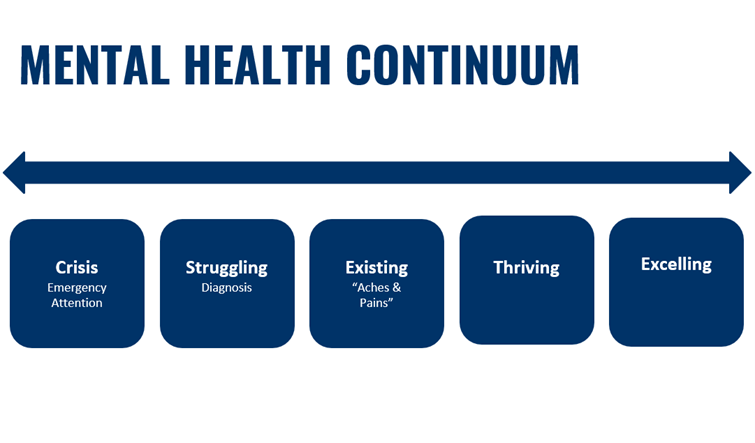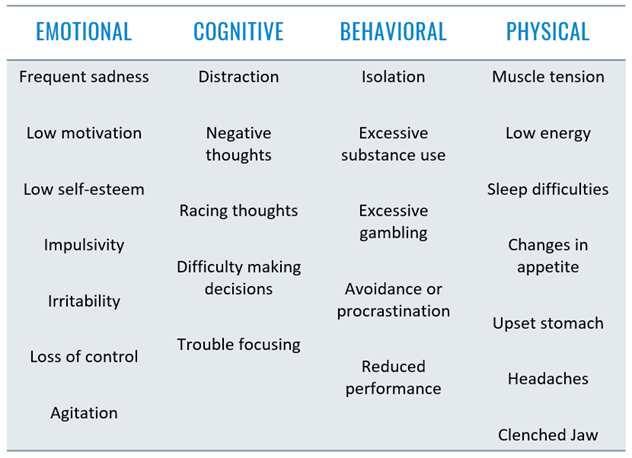Consistently check on your mental well-being. Ask yourself every day where you are on this continuum. Developing coping strategies, setting boundaries and accessing professional support and resources are the best ways to move toward thriving and excelling.
In recent years, there has been an increase in commentary on the topic of mental health, including in professional sports. Many factors have contributed to this interest: efforts to decrease stigma, experiences of shared stress and community trauma, and an increase in teams' and organizations’ acknowledgment of the importance and visibility of mental health resources.
Like all forms of health, mental health can be measured along a continuum. The Mental Health Continuum is a framework for understanding mental health and checking on your own mental health. At any given time, you may find that you are excelling or thriving, just existing, struggling or in crisis.

People often are most aware of their mental health when they are struggling or in crisis. However, everyone can benefit from assessing where they fall on the continuum and responding appropriately.
In the sections below, we will break down what each of these categories means, as well as how you might respond if you find yourself at this point on the spectrum. The good news? Most of you use this exact same approach with your physical health and well-being – so it may come naturally to you. As we walk you through these sections, we will discuss what this looks like in terms of both your physical and mental well-being, to further demonstrate this connection.
When you are excelling or thriving physically, you’re feeling your best. After exercise, you can recover optimally, with minimal soreness. Athletes who excel or thrive physically are likely proactive in taking care of themselves. They follow a consistent daily process for recovery and may be working trainers to prevent injuries.
When you are excelling or thriving mentally, you’re feeling energized, performing well in most areas of life and experiencing strong relationships. At these points on the mental health continuum, it helps to be proactive and consistent with your self-care, which can keep you excelling or thriving. This includes creating and maintaining daily practices for taking care of your mental health: for example, meditating in the morning, checking in with loved ones in the evening or setting boundaries on your time (e.g., no phone calls after 9 p.m.).
When you’re just existing, you aren’t feeling your best, but you aren’t feeling your worst. Physically, you may have some aches and pains — feeling sore, tight and tired — without being injured. When athletes feel this way, they may focus their awareness on what they’re feeling, investing more time and energy in their recovery process, and working with athletic training staff to feel better.
Mentally, existing means experiencing some “psychological aches and pains.” You may feel stressed, experience a worse mood, have worries or negative thoughts, and feel more irritable and agitated (see table for more examples).

Experiencing these sensations suggests you may be drifting toward the left side of the continuum, away from thriving and excelling.
This is perhaps one of the most important categories to be aware of – and is often neglected or minimized. Think about it this way: What if you ignored physical aches and pains? What if you only took care of your body when you were injured? Chances are that you’d be injured more frequently and the injuries would be more disruptive.
If you find yourself just existing, consider investing more time and energy in your mental health. You could increase your use of coping strategies, prioritize rest or set more boundaries. And you can always reach out for support. Just like you work with trainers to progress physically, you can work with a mental health professional to develop skills to move toward thriving and excelling.
When someone is struggling, they meet the criteria for some kind of medical diagnosis, whether a physical condition like an injury or a mental condition like depression, generalized anxiety or posttraumatic stress disorder.
As you would with a physical injury, you can address mental health concerns by meeting with a professional, creating a treatment plan and following through on that plan. There are a variety of treatment options that are helpful in treating mental health conditions.
When someone is in crisis, they are experiencing an emergency that immediate medical attention. In a mental health crisis, your own safety or someone else’s may be at risk.